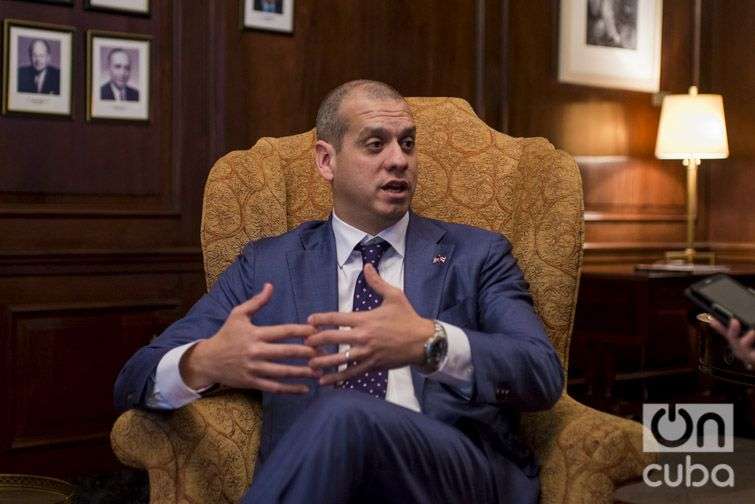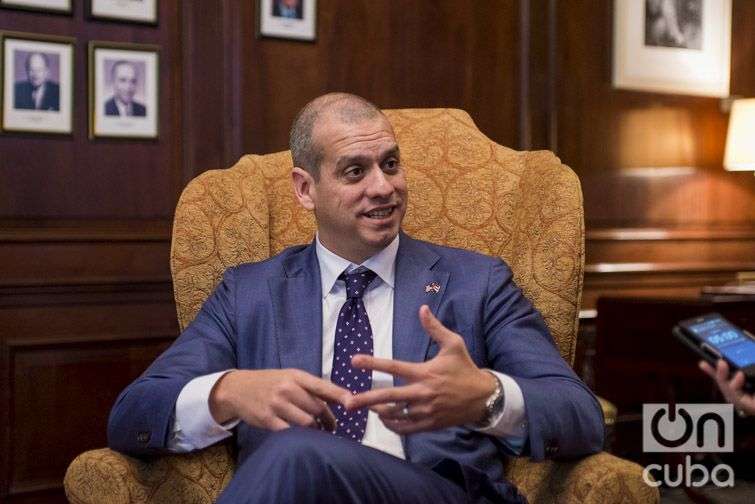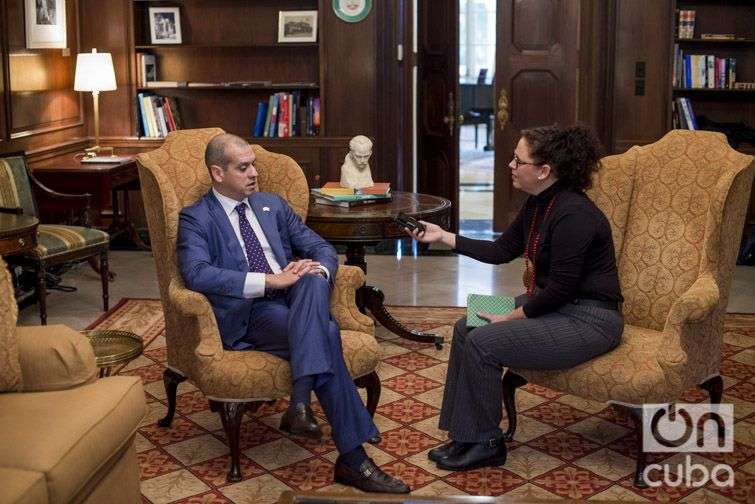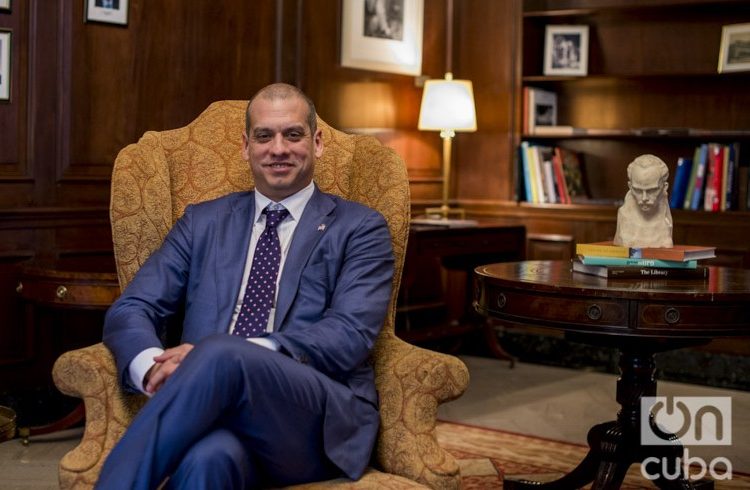Daniel Sepulveda, Deputy Assistant Secretary of State and U.S. Coordinator for International Communications and Information Policy at the State Department, and one of the first American officials to get involved in the U.S.-Cuba normalization process, visited Cuba for the second time.
He had been in Cuba before leading a governmental delegation that held talks with the Cuban government about telecommunications in March 2015. Although from different perspectives, both countries are very interested on the issue, which is a priority in the bilateral agenda.
It is also a topic of great interest to the public, who have been expectant, hoping to see changes fast. Only a quarter of the Cuban population has access to the internet, according to official figures, and most of these connections are very slow. Few Cubans have access to the internet at home.
Sepulveda said that on that first trip both sides held talks about the regulatory and legal changes made by the United States.
“We explained our system of government and our legal structure for the exchange of commerce, particularly in technology and telecommunications, with our aim to have Cuban commercial entities – in his case ETECSA – and American communications and technology companies work together to connect the people of Cuba to the global internet,” he said.
Sepulveda just visited Havana again with the same purposes. This time his delegation included more than government officials. He was joined by two academics, the leader of an association of technology and telecommunications companies, a couple of executives, and FCC Chair Tom Wheeler.
“We are here to exchange ideas and viewpoints on what is necessary from a policy perspective to encourage the investment in infrastructure necessary to connect Cubans to the internet,” he said.
“We did a few days of meetings with the Ministry of [Foreign] Investment and Trade, the Ministry of Communications, and the President of ETECSA. I met with independent bloggers, we had a very nice dinner and a conversation about the future of Cuba, from their perspective, and about the internet. And we did two university events, where we talked to students and faculty about our interest in this space. That’s the model that we follow in other parts of the world.”
Some people think that progress in this field is not being made at a desirable pace. What do you think has changed from your previous visit to date?
Americans are an impatient people. When we say go people move. This is a complicated area of commerce and you have to figure in the fact that commerce wasn’t allowed between our two countries, in this or in any other space for many, many years.
What has happened since the opening? There have been two, maybe three major agreements signed between ETECSA and American companies in order to allow that, when Americans come to Cuba, they are able to continue their communications with the United States, and to do that the company – whether be Verizon or Sprint – can pay ETECSA to allow their users to continue to communicate. That’s the first step.
Outside of that, Cubans have continued expanding the number of public WiFi hotspots and reducing the price of the service. We are publishing for additional independent measures in that way. But we are also are encouraging the examination and a positive outlook for a submarine cable for the internet between Miami and Havana. There are multiple proposals before the Cuban government to do that.
Our colleagues in Cuba argue that they already have a submarine cable that comes from Venezuela. But we, and I think most technical experts and engineers would argue that to have a cable from Miami to Havana would be useful for a number of reasons, including the reduction of latency, and in case that something happens to the cable coming from the south. Communications coming from the North would be dramatically more efficient that then ones coming from Venezuela. We had a conversation about that.
Then, once you hit the island, you have to talk about the infrastructure on the island, and we would like to see the ability and the interest from ETECSA to engage in joint ventures with companies that have expertise in cell towers, or in deploying wireless networks, so that you can take the backbone that ETECSA owns and operates, and build on it, together: ETECSA and an American company, or any company in the world.
You can leapfrog technologies. Right now you are at second generation technologies. That was invented in 1992. You can leapfrog third generation, go straight to fourth generation technology, and there are companies that can help you and want to help you to do that, but that’s going to require allowing some degree of competition, some degree of foreign direct investment, and being open and willing to engage in joint ventures to achieve that.
All we can do is show where we’ve worked in the world. The models exist. The Dominican Republic exists and connecting dramatically more people that Cuba; Vietnam exists and is connecting more people than Cuba. There are models and mechanism that you can use to move forward with this sort of deployment, and to ensure that you are getting both modern communications and that induvial people have access to those communications.

What’s your assessment of the interest Cuban officials have in these joint ventures with American companies? Do you think they could be more interested in finding partners from other countries?
I’m not a commercial officer. I’m not here to sell things. I’m here to talk about public policy, so whoever they want to partner with, they need a policy that allows for ETECSA to open its infrastructure to other partners and to other competitors. That doesn’t exist today.
In my interactions with the Vice Minister (of Communications) and with ETECSA, they are open to conversation. It’s just going to be a very slow conversation. In the United States we are not used to that pace of progress. But, again, I fully respect that it is their right to proceed at whatever pace they wish.
I feel a sense of urgency because my president’s administration is coming to an end, and I’m a political appointee, so when this administration comes to an end, I come to an end. And I want to make use that we are doing everything we can while President Obama is president to make the openings that we’ve been able to achieve under the law stick. That will help us build towards a greater coming together.
The FCC recently removed Cuba from its exclusion list. What does this mean from a practical point of view?
If we hadn’t done that, then a company has to ask the FCC before they engage in direct commerce with ETECSA, and now they don’t. So it’s just the removal of one bureaucratic process for the system, but more importantly, it’s a signal from our government to our industry that we want you to engage Cuba, we want the island and its people connected, not just to us but to the global internet, and everything that it affords, for development purposes for the good of the hemisphere and because we made commitments to try to connect everyone in the world to the internet.
Some people think there’s the risk that telecommunications could be used to interfere with Cuba’s sovereignty. Is it possible that that perception – not only here but in certain sectors in the United States – could be an obstacle to these initiatives to improve access to the internet in Cuba?
There are issues of trust, whether it’s the government trusting our government, or the government trusting our enterprises, our telecommunication providers, and the people trusting either us, as a government and our enterprises. That’s the primary obstacle in moving forward.
What we are saying is that there’s nothing to fear from an opening to the internet. Cuba will continue being Cuba. Only the people of Cuba can determine their future. The French are not less French because they are connected to the internet. They are more French every day. There is always going to be some degree of uncertainty with change. But I can tell you that we and our people have benefitted dramatically from access to the internet and we’ve seen it all over the world, and we’ve seen it all over this hemisphere. Chile has 72{bb302c39ef77509544c7d3ea992cb94710211e0fa5985a4a3940706d9b0380de} penetration to the internet; that is almost as high as the United States. Maybe it’s not comparable to Cuba, because of where it is economically, but Haiti is better connected than Cuba, and Haiti is poorer than Cuba! The Dominican Republic is dramatically better connected. Jamaica is better connected.
Cuba is the least connected nation in the entire hemisphere, by far, and that’s not because of the embargo, that’s not because of technology, and that’s not because of money, it’s because of public policy. And there are clear examples of alternate mechanisms by which to manage your telecommunications infrastructure that leads to greater success, even within an economic and political system that does not concur with ours: Vietnam, Myanmar, Ecuador, Bolivia…
You say that the blockade played no role in…
That’s not what I’m saying. The embargo did, for many years, limit many ways in which American companies could help or work with the Cuban enterprises to expand access on the island, and that was a limitation to the ability of the Cuban people… not a final barrier, but a limitation. They could still work with an Italian company at some point, they could work with any European company, any Latin American company. So it wasn’t a determinative barrier, but it was certainly an impediment to success. We have removed that impediment, very specifically in this sector, and we are asking and welcoming the engagement, the cooperation and the collaboration to work towards a connected island.

In 2009, President Obama signed a memorandum to “promote democracy and human rights in Cuba,” allowing, and more than that, encouraging companies to approach Cuba to reach agreements aimed at setting up satellite and fiber optic telecommunications to connect the United States and Cuba. There were some attempts, apparently. For instance, TeleCuba Communications Inc. said that they had secured an OFAC license to install a 110-mile submarine cable from Key West to Havana. It was an 18 million dollar project that was supposed to be completed by 2011. According to press reports from those years, it was the blockade itself what kept those plans from being implemented…
No, that’s not correct. There was an opening in 2009 of some of the regulations related to technology and telecommunications. It was nothing compared to what we’ve done since the president’s speech of a change in policy toward Cuba that includes very dramatic regulatory changes that allows very specific companies in the United States to engage directly with ETECSA that is a state-owned enterprise. It’s the only state-owned enterprise that our regulations allow commerce with. That’s a dramatic change. ETECSA never approved a submarine cable from Miami to Havana, never, not before 2009, not now. And it wholly within the power of ETECSA to do that. It’s completely legal, it would be good for the internet, it would be good to our relations, and what they’ve said to us is that they are open to the concept. They want to see proposals on paper, they want to know that it will work, and they want to feel trust with us that it’s something that we can have confidence in going forward. And we are going to work to build that trust.
What impact do you think this deployment of digital networks and expanded access to the internet could have on the Cuban economy? Could this help the country overcome – or at least start to get out of – its long and profound economic crisis?
The [Cuban] government has conveyed to us that they have 11 areas of priority: agriculture, mining, transportation, health, biotechnology, and a few others. Telecommunications is not one of those areas. Technology and connection to the internet is not one of those priorities. And that’s fine: every government has the right to develop its economy as they see fit. My only point to my colleagues in Cuba was this: if you want your agricultural sector to be successful, if you want your hospitals to provide healthcare that is good, and if you want the people not to get sick, they all need to be connected to the information necessary to be successful.
The internet and telecommunications is foundational. It affects every aspect of the economy, and every country in the world is working to build on that premise. We’ve moved from an industrial society, an industrial world, to an information society, which for an island is a great thing, because on an island you don’t have enough people to be an industrial power. You cannot build, and develop, and distribute cars around the world. But you have enough people and intelligence to export ideas and services, but you need a vehicle over which to export those ideas and services. And the vehicle that exists is the global internet, and if you are not connected you can’t be competitive, you can’t create work, you can’t create opportunity, and you are wasting talent; the evident talent that exists on this island, the creativity on this island, the beauty on this island. It could be a force in the world, but you need a mechanism by which show the world, and engage the world. The vehicle we have for that is our global communication system.

You were saying that you want to do everything in your power while Obama is still the president…
And I’d like to do more after that, but I won’t be in the government…
What I mean is that some people see the end of the current administration as a sort of deadline in this process, based on the belief that these measures could be reversed by the next government. In your opinion, what can we expect from this upcoming change?
What I know is what I can control, and what my president can direct his government to do. I think it would be very hard to truly reverse the actions that the president has taken, but it wouldn’t be that hard to either slow it down, or to not make more progress, depending on how high a priority it is. Both to the president and to other people who serve him in these areas of public policy.
The president has extended the hand of the United States to Cuba, and at this point we are looking for Cuba to extend that hand back. Our people want to come here, our enterprises, our academics, scientists and technologists, particularly the technology community. They want to work here, and share what they know with the Cuban people, and help build an information society here in Cuba, a technology community here in Cuba, that will work on its own way, but the minimum is to get connected.
What we are asking from the Cuban government and our colleagues is to feel that sense of urgency, and to work with us. They made it quite clear to me that they are still frustrated, that they are still unhappy with us, that they believe we can and should be doing much more. What I’ve said to them is let’s make the most of what we are doing so that we can build on in going forward. Otherwise it will be very hard to convince people to take the risk to continue opening.
I’ve travelled the world. It’s an honor and a pleasure to be able to travel the world. My family is original from Chile, and I feel very comfortable here speaking Spanish with my colleagues. I like the food, I love the music… I feel comfortable here. On a personal basis, with the people I’m sitting across the table with, I feel that if it was just between us we could figure this out, so we just need to continue trying.
It hasn’t been officially confirmed, but we’ve heard about a possible visit of President Obama to Cuba in March. Do you think that these talks on telecommunications may have reached some kind of results by then? Can we expect any positive announcement before that visit?
I don’t know if the president is coming, but whether he comes or not we are going to continue working on this issues. Cisco has this thing called NetAcademies, where they partner with universities and countries around the world, and they run workshops in trainings to certify students and professors in Cisco systems, so that they’re certified operators of those systems, and they can sell their services and train others to do the same things. One of the projects that’s been worked on now is a conversation between Cisco and UCI to build one of those here. And I would be very excited to come back here when that’s successfully starting.
I would love to be at the ribbon cutting for the cable connection between Miami and Havana. I think it would be a psychological and a physical connection between the two countries. There was a telephone cable by AT&T before there was an embargo. We need to restore that physical tie, not just because it is good for the internet, not just because it makes sense technologically and from an engineering perspective, but because it would help heal, it would be a physical signal of healing. And so we are going to continue making the case, and see what happen.










